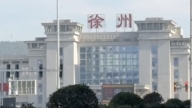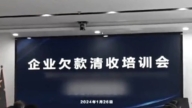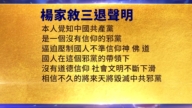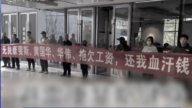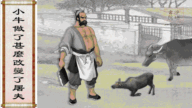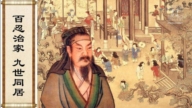【新唐人2011年11月29日讯】大陆2012年度国家公务员考试27号举行,133万考生将争取1万8千个职位,竞争激烈。值得注意的是,今年的考试特别强调对考生的“品德考察”,瘦肉精、黑作坊等事件都被列入考题。不过民众担心这种所谓“德考”会成为另一场“拼爹游戏”。也有媒体指出,需要品德考察的恰恰是公务员考试本身。
在中国大陆,因为政府公务员福利待遇好,社会地位高,一年一度的国家公务员考试(国考)吸引了越来越多的高学历人群。在正在进行的2012年度公务员考试中,最热门职位的竞争比例甚至高达4124:1。
今年的公务员考试在录用上,要求加强对考生“品德”的考察,考生在大学的平时成绩,和老师的毕业点评等,都将列入评分标准。国家公务员局宣称,考生政治品德不良、社会责任感较差将不得录用为国家公务员。
对此,大陆民众孙先生对《新唐人》表示,中共的品德是以共产党党纲来定义的,它谈的不是做人的伦理道德,更不是孔孟的圣贤道德,服从党纲品德就好,不服从就不好,所以品德考察没有一个标准。一般都是把公务员当作一种投资、一种商业模式,在中国买官卖官是很正常的事情。
孙先生:“大多数情况下,要报考公务员体制的话,要过很多层的难关,村里面的、市里面的、各种方面的,每个方面都要过这难关。在各种情况下都要疏通关系,都要花不少钱,大多数公务员肯定会利用职务之便,要回他付出的成本,甚至比付出的这成本要大几倍。”
《四川在线》发表的一篇评论认为,这是给一些特权人士提供的又一个可以暗箱操作的空间。
《济南日报》评论指出,历年来,在国考中频频出现“拼爹游戏”、体检时“被乙肝”、“被不合格”等不公平现象,现在又来个“品德考察”,这很可能为考试不公再次埋下伏笔、再添一道豁口。
也有媒体直言,最需要品德考察的其实是国考本身。
中国反腐败人士司马先生表示,公务员招聘每年都是挤破头,说明这个社会权利高于一切,是个官本位的社会。很多当官的刚进入官场也是想好好做事的,但在现有官场生态下,好官不但做不了事情,还会被排挤。
司马先生:“好人在官场是做不了事的,官场里面形成了一个逆向淘汰机制,劣币驱逐良币,因为中国官场提拔选拔是由上面那个人决定的。这种体制下,说加强官德加强品德培养,这是一个笑话嘛。”
司马先生提到,过去有一句话说“做人的优点恰恰是做官的缺点”,他表示,做人要求诚实、要求善良,要求富有同情心,但是这样的人在官场肯定是头破血流、寸步难行。
司马先生:“你不从官僚选拔体制进行改革,那些想法只是欺骗人的动人的言词,没有实际效果的。”
《人民日报》一篇评论文章也提到,近年来某些地方在招聘过程中,泄题、作弊、“萝卜招聘”等行径频频曝光,引发公众的不安甚至愤怒,政府的公信力也遭到挑战。“德考”要成为一道失德者难以逾越的门坎,还须做到可操作、有实效,找到足以服众的路径。
新唐人记者周玉林、李庭、肖颜采访报导。
**************
China’s 2012 national civil service examination was held on
Nov.27, 2011 with 1.33 million candidates competing for 18,000 positions.
It is noteworthy that this year’s exam plays special emphasis
on candidate’s “morality."
Issues of clenbuterol, sweatshops, etc.
were listed among the exam questions.
But people worry that the so-called “morality test" is just
another competition of who’s parents have more power.
Some media pointed out that the civil service test
itself is in need of a morality check.
In Mainland China, civil service jobs have better benefits and
a high social status.
The annual national civil service exam attracts
a growing number of highly educated people.
In the ongoing 2012 civil service examination,
the ratio of people trying out for the top position is as high as 4124 to1.
This year’s civil service examination calls for strengthening
the “morality" of the candidates.
College transcripts and graduation statements from teachers
are included in the scoring criteria.
National Emblem of the PRC announced that candidates with
a bad moral character and poor sense of social responsibility will not be employed as civil servants.
In this regard, Mr. Sun from China told NTD that the
Chinese Communist Party (CCP)’s moral standard is defined by the Community Party principle,
which is not about the being ethical and moral,
and not in accordance with Confucianism.
It is about obedience to CCP principles.
So there is no moral standard.
In China working in the civil service is treated as an
investment;
a business model where buying and selling one’s position
is the norm.
Mr. Sun: “In most cases, one has to bypass many layers of
barriers to apply for the civil service exam,
the village level, the city level, in every aspect of has to
bypass a barrier.
At each level, if one wants to break through the barriers
it’s a matter of who you know and how much money you want to spend making bribes.
Most civil servants will certainly use their positions to get the
investment returned, and to make even further profit. ”
Sichuan.scol.com.cn published an article stating that this
provides more space for those in power to conduct operations “behind closed doors”.
Jinan Daily has a commentary article, stating that these types
of “competitions of who’s parents have more power” have appeared each year during the national civil exams.
Also, during the physical exams, many candidates were
“diagnosed with Hepatitis B,” or “not qualified.”
This new “morality test” is very likely another
way to further corrupt the exam.
Some media stated directly that exam process itself
needs a morality test.
China’s anti-corruption activist Mr. Sima expressed that
the recruiting process of civil servants is highly competitive.
This shows that power is placed above anything
else in this society.
Many officials also wanted to do good deeds at the beginning,
but in this system, not only can they not do good deeds, but they are also eliminated from these positions.
Mr. Sima: “Good people cannot do anything good.
The official circle has a reverse trend of elimination.
Bad people get rid of good people.
The selection and promotion process is decided by those above.
To talk about strengthening morality in this kind of system
is a joke.”
Mr. Sima mentioned an old saying, “the good qualities of a
person are shortcomings of an official.”
Honesty, kindness and compassion are good qualities of a man,
but such a person will for sure fail in the world of officials.
Mr. Sima: “Without reform to the selection process,
it is only a pleasant statement with no real impact.”
People’s Daily published a commentary article about
frequent exposures of revealing exam questions,
cheating and hiring friends and relatives during the national
civic service recruiting process in some areas in recent years,
which led to public unrest and even anger.
The government’s credibility has also been challenged.
In order for the so-called “morality test” to be considered an
truly rigorous test of morality, the process must be operational, effective, and convincing to the public.
NTD reporters Zhou Yulin, Li Ting and Xiao Yan



